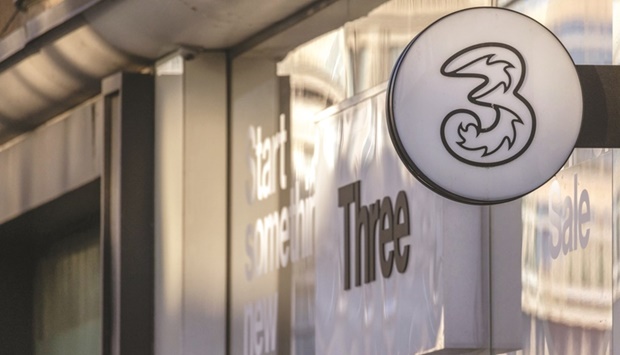Vodafone Group Plc said it’s in discussions with Three UK-owner CK Hutchison Holdings Ltd about combining their British mobile businesses, a long-speculated tie-up that comes after several other attempts to consolidate European telecommunications.
Newbury, England-based Vodafone would hold 51% of the combined business and Hong Kong conglomerate CK Hutchison, 49%, Vodafone said in a statement yesterday, adding there’s no certainty a deal will be reached. CK Hutchison also confirmed the talks separately.
The ownership stakes would be determined by relative allocations of debt, and there won’t be a cash consideration, the statement added.
A potential deal between Vodafone and Three UK has been talked about for years, and Vodafone has previously teamed up with CK Hutchison in other markets such as Australia. Vodafone expressed interest late last year in acquiring its smaller rival, Bloomberg previously reported.
Shares in Vodafone rose 2.6% to 103.74 pence in London tradin, and earlier gained as much as 3.6% following the statement. The advanced talks were reported earlier by Sky News.
“By combining our businesses, Vodafone UK and Three UK will gain the necessary scale to be able to accelerate the roll-out of full 5G,” Vodafone said in the statement. “The merged business would challenge the two already consolidated players for all UK customers,” it added, referring to BT Group Plc and Virgin Media O2, which both struck mergers in recent years and offer fixed and wireless services.
Vodafone’s statement added that both it and Three struggle to earn back their cost of capital in the UK, citing regulator Ofcom, and said the UK is at risk of losing opportunities from next-generation 5G wireless technology.
Vodafone has become increasingly vulnerable after losing half its market value in the last five years. Chief executive officer Nick Read is trying to merge units with rivals in several key markets, while facing pressure from shareholders including Europe’s largest activist fund, Cevian Capital AB. A vehicle backed by French billionaire Xavier Niel also bought a 2.5% stake in Vodafone last month, citing opportunities to “accelerate” deals.
Read has openly said he’s pursuing a deal in the UK, and Three UK CEO Robert Finnegan has likewise said he wants to consolidate the market.
Read also said he wants deals in Spain, Italy and Portugal - but it’s been a bumpy road. Rival Orange SA clinched the biggest likely deal in Spain, and Read turned down an offer for Vodafone Italy from Niel’s Iliad SA.
However, along with the UK talks, there are other signs of progress for Vodafone: On Friday it announced it agreed to acquire small Portuguese rival Nowo. Private equity giants including KKR & Co are vying for a stake in Vodafone’s mobile mast business Vantage Towers AG, Bloomberg reported last month. And in August, Vodafone agreed to sell its Hungarian business in a deal valued at $1.8bn.
A Vodafone-Three merger would face intense antitrust scrutiny.
Telecommunications companies are paying billions to build faster and more efficient 5G and fibre networks, while revenues stagnate amid competition from challengers and Big Tech. Still, regulators have previously blocked combinations that would reduce the number of operators in each market. In 2016, Three was prevented from buying Telefonica SA’s O2 business in the UK by the European Union with backing from British watchdog Ofcom.
In 2020, however, that decision was toppled by the European General Court, and a final ruling on the matter from the European Court of Justice in the first quarter of next year could pave the way to more deals, according to analysts at Moody’s Corp. Another test case comes with the merger of Orange and Masmovil Ibercom SA in Spain, agreed in March.
The UK’s Competition and Markets Authority “might consider remedies to maintain retail competition, including requiring the merged firm to reserve a portion of network capacity for virtual players,” said Assembly Research analyst James Robinson in an emailed comment, referring to “virtual” mobile network operators which don’t own their own networks, such as Tesco and Sky. He added that he expects the CMA will want to protect against consumer price rises amid a cost of living crisis in the UK.

A sign outside a Three mobile phone store, operated by CK Hutchison Holdings, in London. Vodafone said it’s in discussions with Three UK-owner CK Hutchison about combining their British mobile businesses, a long-speculated tie-up that comes after several other attempts to consolidate European telecommunications.
